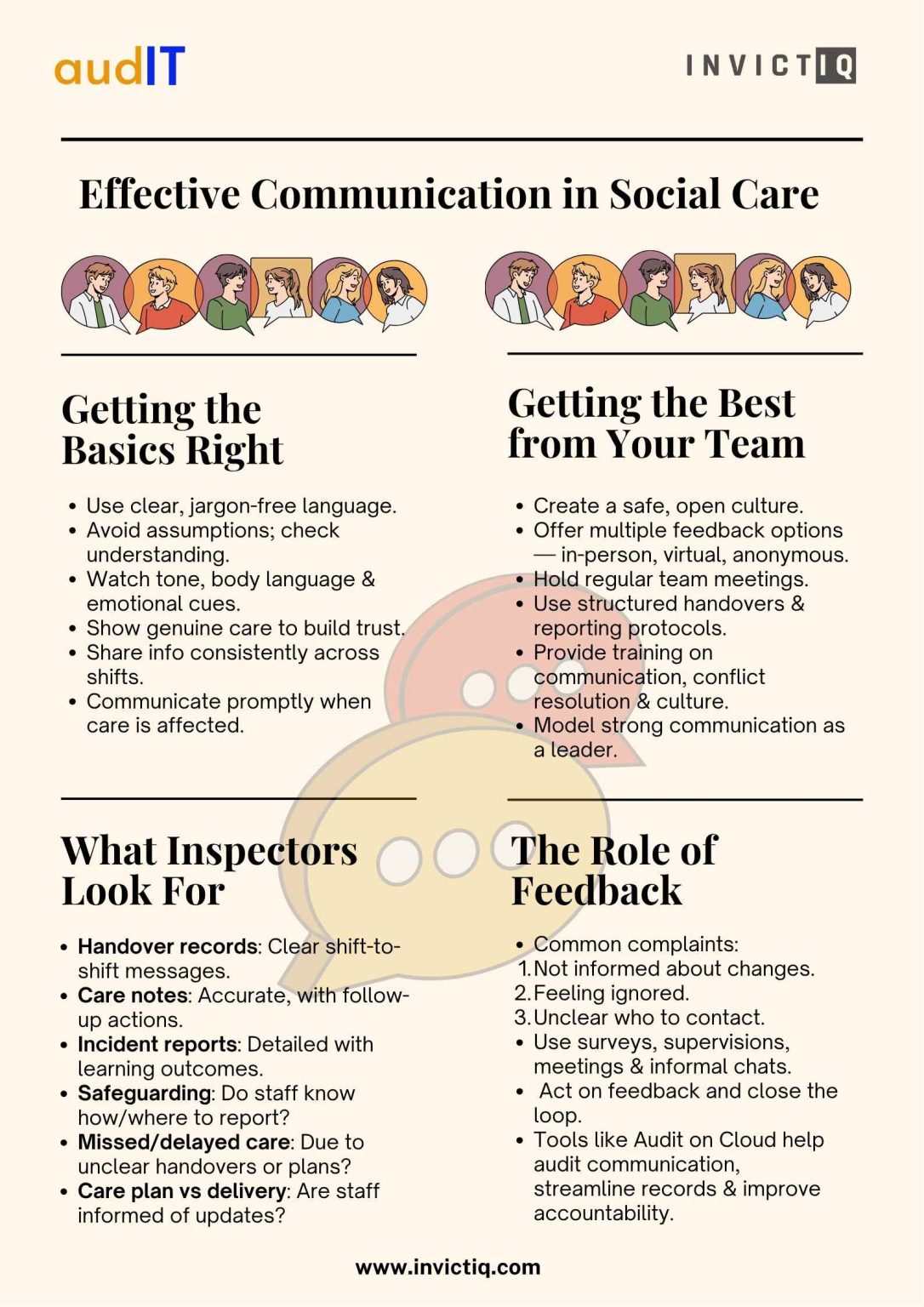Communication is important in any sector, however in social care I think it is vital. Having worked in an admin function pre social care, I remember this being mainly notes, passing on messages, updating a system, whereas social care, it’s really about how we foster that communication, how our teams feel supported, the compliance element due to regulation, the wellbeing of our teams and those we support and ultimately it impacts the services we manage.
I thought I would dive into some simple tools and tips for effectively communicating.
Getting the basics right
Effective communication starts with some core basics, and I won’t spend ages on this, as there are so many articles which dive into these points and much more, however it is crucial that we have these elements:
- Use straightforward, jargon-free language.
- Avoid assumptions and ensure that messages are easy to understand.
- Pay attention not just to words, but also to tone, body language and emotional cues. A good technique is to reflect what you’ve heard to confirm understanding.
- Show genuine care and understanding to build trust and encourage openness.
- Ensure information is shared consistently across shifts and teams to avoid confusion.
- Share information promptly, especially when it affects care delivery or safety.
How to get the best out of your team
COVID taught me some very good lessons, both personally and professionally, but communication was one of those. I remember speaking to managers where complaints were centred around the unknown or lack of information and felt lucky I didn’t have those concerns. I reflect about what went well during the pandemic and what didn’t and if I am honest communication really was something I am proud we got 99% right and I have embedded the learning from the shortcomings into each team I have overseen since. My key tips are:
- Foster a culture of openness where staff feel safe to speak up about concerns or ideas.
- Have various methods for feedback/idea sharing, both in-person, virtually and don’t forget anonymous.
- Hold regular team meetings to share updates, celebrate successes and address concerns.
- Implement structured communication protocols to standardise handovers and reports.
- Provide training on communication styles, conflict resolution and cultural awareness to help educate your team and to understand one another better.
- Lead by example and model the communication behaviours you want to see in your team.
What inspectors are looking for?
Inspectors want to ensure assured that you and your team are communicating effectively and will look at:
- Handover records and check they are detailed and pass on key concerns and messages from one shift to another.
- Care notes and if they accurately document care provided, changes in someone’s condition and for any concerns raised. From this they will then want to see the actions and steps taken so be sure to triangulate evidence for this.
- Incident reports to check they are thorough and whether they show evidence of follow-up and learning?
- Safeguarding concerns and whether these were due to staff being unsure of what to do or who to report concerns to.
- Missed or delayed care due to poor handovers, poor planning and communication or clear instructions and care plans.
- Care plan vs delivery and how staff are aware of changes to the care required/risk assessments.
Whilst inspectors will be checking for these things, you can begin to implement audits to check this yourself. Systems like Audit on Cloud by InvictIQ allow you to build you own audits, which can greatly enhance the quality and consistency of care by streamlining documentation, improving communication and ensure accountability within your service and team.
The importance of feedback and feedback loops
Staff and the people we support (and their families) are often the first to notice communication issues, and if not addressed can lead to complaints. Based on some information available, the three common complaints include:
- Not being informed about changes in care or staffing.
- Feeling ignored or not listened to.
- Confusion about who to speak to regarding concerns.
It is therefore important that we regularly seek feedback, through surveys, supervisions, team meetings, complaints or informal conversations and utilise the date to identify and address communication gaps. It is also important to close the communication circle and feedback loop by acting on the feedback and communicating what has been changed.
I am not writing anything groundbreaking here, and these are all things you like do within your services as a manager, but it’s important our teams also embed how they communicate with each other, the people they support, relatives and professionals. I do truly believe that communication unpins so much of what we do in social care, it ensures person centred care, safe practices and stronger, connected teams.



